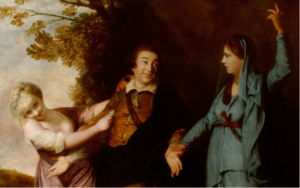Comedy and its Borders
18th International Connotations Symposium
July 29 – 31, 2025
Ruhr University Bochum (Germany)
In Shakespeare’s Love’s Labour’s Lost, “these ladies’ courtesy / Might well have made our sport a comedy”, but the standard happy ending is prevented – or delayed – by the death of the King of France. Berowne, the speaker of the lines just quoted, is told to visit the sick and the dying for one year and to entertain them with his jests, a task that he thinks is impossible to accomplish: “Mirth cannot move a soul in agony.” With the unusual ending of Love’s Labour’s Lost, Shakespeare tests — and stretches — the limits of comedy. So does his contemporary Ben Jonson. In the preface to Volpone, he admits that the ending of his play “may, in the strict rigour of comic law, meet with censure”, but he defends the harsh punishment meted out to the characters as still falling within the confines of comedy. More than a century later, Richard Steele pushes the limits of the genre in a completely different direction, towards the sympathetic and the sentimental, arguing that tears and “a joy too exquisite for laughter” are legitimate audience responses to a comedy.
While Shakespeare, Jonson and Steele extend the borders of the genre, other writers wish to redraw them in a more restrictive fashion. In the preface to The Way of the World, William Congreve complains that the “Characters which are meant to be ridiculous in most of our Comedies, are of Fools so gross, that […] instead of moving our Mirth, they ought to excite our Compassion”; in other words, he excludes farce from comedy. Henry Fielding similarly distinguishes laughing at “Ugliness, Infirmity, or Poverty”, which he considers ill-natured, from laughing at affectation, which he considers legitimate. He thus draws on Hobbes’s theory of laughter but adds a moral dimension to it. Laughter is no longer a mere expression of a superiority; it is the expression of a superiority that is morally justified.
The examples show that playwrights may explore the borders of comedy in the plays themselves, as Shakespeare does in Love’s Labour’s Lost, or in theoretical paratexts, as the other writers do. The examples also show that comedy has many borders and that the adjacent genres or modes are of different kinds: the tragic, the serious, the sentimental, the farcical, the grotesque, the absurd, the cringy, etc. Moreover, the historical dimension of the subject plays a crucial part. The borders between comedy and tragedy or between comedy and farce are drawn differently at different times. In the twentieth century, for instance, writers appear to be particularly keen to extend comedy in the direction of farce; Samuel Beckett’s Waiting for Godot and Joe Orton’s What the Butler Saw are cases in point.
The emphasis of the conference will be on the borders of dramatic comedy but proposals on other comic genres (the comic novel or essay, the epigram, nonsense poetry, etc.) will be considered as well.
Please send an abstract (300 words max.) to the editors of Connotations
by October 31, 2024:
